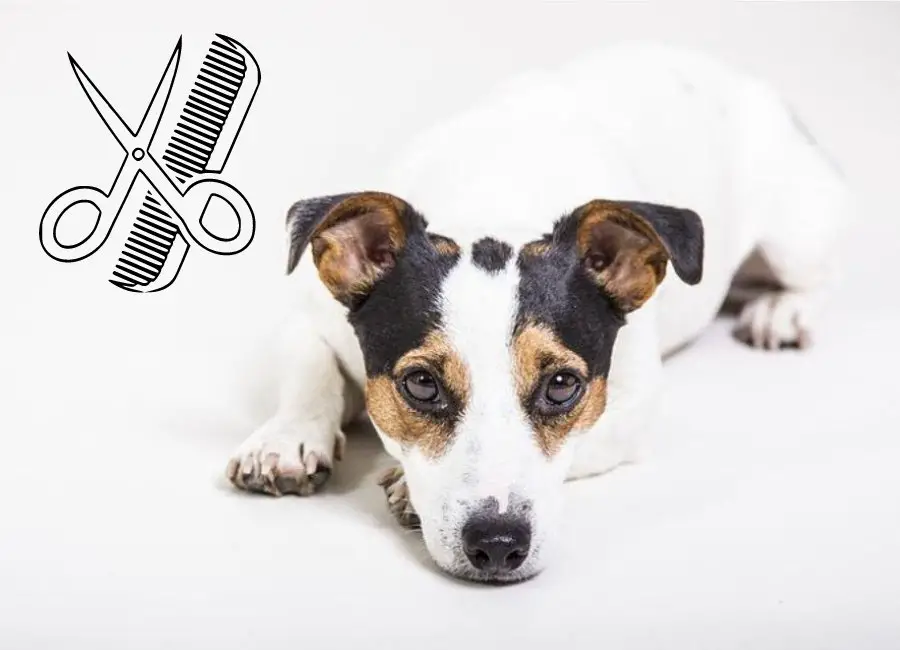7 Ways To Reduce Jack Russell Shedding & Causes

Jack Russell shedding excessively can become a serious issue for those who don’t know that Jack Russell terriers shed.
I will be discussing Jack Russell shedding, starting from why they may shed more to how you can minimize Jack Russell shedding.
Jack Russell shedding can only become an issue for those who are not comfortable having hairs around their stuff or when the shedding becomes excessive.
Do Jack Russell terriers shed
Yes, both smooth and rough coats Jack Russell terriers can be categorized as a shedding breed since they shed quite a bit all year long, with spring and summer being the seasons when they shed the most and shedding less during winter.
If you are looking for a breed that won’t shed at all then Jack Russell terriers are not for you because they do shed.
One of the best thing you should know is that you should learn to deal with the fact that they do shed, as this can help you live happily with them.
There is absolutely nothing you can do to stop them from shedding, but you can minimize excessive Jack Russell shedding.
If you want to live happily with your Jack Russell terrier then you need a vacuum cleaner and may be covered your sofa with clothes you can easily remove.
Even though they shed, there are circumstances that lead to unnecessary and excessive Jack Russell shedding which I will be discussing below.
Causes of Jack Russell shedding excessively
Poor nutrition, inadequate brushing, parasite infestations, allergies, and the season are the most common causes of excessive shedding in Jack Russell terriers.
The following are some of the most typical reasons why Jack Russell terriers shed excessively:
1. Seasonality
Seasonality impacts the pace or quantity of shedding, making certain times of year one of the primary factors of excessive Jack Russell shedding.
The hair of Jack Russell terriers will shed significantly more in the spring than in the winter.
So it seems fair to suppose that the season has an impact on how much Jack Russell terriers shed.
Jack Russells shed their winter coats in the spring to avoid the summer heat, and they grow hair in the summer to strengthen them for the next winter.
Keep your Jack Russell’s temperature down in the spring since the warmer weather causes them to shed less.
If you don’t take care of your Jack Russell terriers throughout the summer, you’ll be shocked at how much they shed.
2. Responding to allergic reactions
The skin of a Jack Russell might get inflamed due to sensitivity to particular foods or environmental toxins, which can result in Jack Russell shedding.
Due to the allergy, your Jack Russell may scratch, lick, or bite themselves, which will cause substantial hair loss.
A few items that might cause allergies in Jack Russell include food, dust, medicines, and bug stings.
The skin of a Jack Russell terrier responds allergically when it comes into touch with something it is sensitive to, which results in hair loss.
This is an unusual type of shedding that only seldom occurs.
As it can surely assist with Jack Russell shedding difficulties, keep your Jack Russell free from any allergies.
3. Certain illnesses
If your Jack Russell terrier is sick, you’ll notice that its hair is losing in clumps more than anything else.
The pattern is changed when your Jack Russell terrier sheds appropriately. There are no clumps associated with this specific type of hair loss.
You must be aware of this in order to treat your Jack Russell as soon as possible to make him feel better.
Hair loss in Jack Russell terriers can be caused by or made worse by a variety of factors including certain canine illnesses.
Some of the most prevalent health conditions in Jack Russells that are related to hair loss include the following:
- Thyroid issues
- Liver conditions
- Skin diseases
- Kidney disease, etc.
4. Anxiety and stress
Overly stressed Jack Russells shed a lot, which is a wonderful illustration of what stress can do to dogs because anxious canines lose their hair.
Be mindful of the possibility of Jack Russells becoming anxious if their daily schedules or mealtimes vary while considering corgi shedding.
Overworked Jack Russell terriers may face hormonal changes that cause excessive or erratic shedding.
When things get really stressed and tense, your Jack Russell terriers will start shedding hair more regularly for the same reason.
For instance, Jack Russell’s tension may be to respond if you return from work and discover that you have hair all over your home.
Stress-related dog hair loss is inextricably tied to Jack Russell’s separation anxiety, depression, and other unpleasant feelings.
5. Inadequate diet or nutrition
Jack Russell shedding will definitely rise with a poor diet or inadequate nutrition.
This is undoubtedly one of the most common reasons for excessive Jack Russell shedding, and the owner is exclusively to blame.
If Jack Russell’s diet is uneven or lacks certain nutrients, Jack Russell will lose more hair than normal. Jack Russell terrier’s health is also impacted by poor diet.
If you observe any particularly excessive shedding after changing your Jack Russell’s diet, regardless of whether it is winter or spring, switch back or consult a veterinarian.
A balanced diet for Jack Russell terriers includes the vitamins and minerals required to maintain good skin, strong hair follicles, and low shedding.
Omega-3 fatty acids should be a part of your Jack Russell terrier’s diet as they have been proved to promote healthy hair growth.
6. Infestations of parasites
Jack Russell terriers who spend more time outside are more vulnerable to parasites like fleas, mites, and lice, but they also have significant hair loss as a result of the infestation.
A single bite from one of these insects can result in a variety of problems, including excessive Jack Russell shedding.
Despite the small amount of shedding, Jack Russell terriers loathe insect bites, and this one can result in some shedding.
If she has a parasite, your Jack Russell terriers will keep shedding until it is eliminated.
Therefore, the Jack Russell terrier will scratch various areas of its body until they grow bald.
Keep your Jack Russell terrier away from fleas since their bites might result in life-threatening allergic responses.
7. Hormonal fluctuations
In dogs, hypothyroidism, a hormonal disorder, can result in significant hair loss.
The thyroid glands of the Jack Russell terrier are impacted, which prevents the production of the hormone thyroxine, which regulates metabolism.
Weight gain, fatigue, losing hair, a thin coat, discolored patches on the skin, and skin discoloration are all side effects of this condition.
If your female Jack Russell terrier hasn’t been neutered, her heat cycles may have an impact on how much fur she sheds all at once.
You could see her shedding more hair at the end of her cycles.
All of these types of hair loss are categorized as hormone shift-induced hair loss.
8. Changing Jack Russell food
When owners of Jack Russell terriers experiment with new recipes rather than adhering to tried-and-true ones, this type of shedding is prevalent.
A change in your Jack Russell’s diet might result in shedding and hair loss.
This is more likely to occur if the food you feed your Jack Russell terrier is deficient in nutrients.
If your Jack Russell’s coat changes after you change your diet, go back to the earlier food.
Your Jack Russell terrier may shed more when you switch to new dog food that lacks specific nutrients in order to make up for the deficit or excess nutrients.
Always talk to your vet before changing your Jack Russell terrier’s food.
9. Skin diseases
Skin conditions, bacterial infections, fungal infections, and parasite infestations can all lead to hair loss in Jack Russells.
These health problems frequently result in a great deal of discomfort and can induce hormonal imbalances, which can cause hair loss.
By consuming raw foods like raw chicken, your Jack Russell terrier might catch bacterial diseases like salmonella.
The problem can be brought on by a fungal infection, which can happen if your Jack Russell comes into touch with mold or other types of fungus.
How to reduce Jack Russell shedding
Here are some typical strategies for reducing or controlling excessive Jack Russell shedding:
1. Give your dog a high-quality diet
Manage the amount and quality of food your Jack Russell consumes.
When dogs consume a balanced diet, they all shed less and have better skin.
To reduce excessive shedding, a Jack Russell terrier’s diet should be nutritious and well-balanced.
Your Jack Russell’s coat health will depend on how well you feed him with a suitable diet.
By feeding your Jack Russell a healthy diet, you can even somewhat lessen internal hair loss.
2. Brush your Jack Russell weekly
One of the most effective ways to remove stray fur from your Jack Russell’s coat and stop him from over-shedding is to brush him frequently.
Before using a bristle brush, try using de-shedding products (like furminators) and other grooming equipment made especially for pups, including grooming gloves.
Most of the time, brushing your Jack Russell once a week would be sufficient, but others may need daily brushing to keep their shedding under control. Along the way, it’s a smart idea to give them rewards.
Brush your Jack Russell outside and keep in mind that they can lose dead hair at any time. For your own sanity, limit the brushing session to fifteen minutes.
3. Keep allergies away
Indications of an allergic reaction include itchy ears, frequent skin-chewing, tears welling up in your Jack Russell’s eyes, and repeated licking of the paw or skin.
One of the most important things you can do to prevent your Jack Russell shedding excessively is to get rid of allergies.
Pollen, mold spores, dust mites, and dead skin cells are just a few allergens that can cause allergic reactions in Jack Russells.
Keep an eye out for rashes or hair loss in your Jack Russell that might indicate a food allergy.
4. Give your Jack Russell a bath
Bathing your Jack Russell helps to lower its temperature, which is vital for shedding and maintains your dog’s skin healthy.
Ask your veterinarian for the appropriate shampoo for your Jack Russell, and then carefully follow the directions.
After bathing, make sure to completely dry your Jack Russell’s skin since if you let it dry naturally, it might develop skin issues.
Keep in mind that leaving your Jack Russell’s skin wet might make your dog vulnerable to parasite attacks.
In order to help control Jack Russell shedding excessively, I recommend giving your Jack Russell a bath at least once every 6 to 7 weeks.
5. Keep your Jack Russell hydrated
To help in controlling Jack Russell shedding excessively, you need to keep your Jack Russell hydrated always.
Make sure your Jack Russell always has access to fresh drinking water to prevent dry skin and to raise body warmth.
This is crucial because dogs that drink insufficient amounts of water tend to have dry skin and hair, which increases their tendency to shed excessively.
If you keep your dog’s water bowl clean and full, the likelihood that dangerous germs may be ingested is decreased.
Check the water bowls of your Jack Russell terrier to ensure that they are only drinking freshwater.
Dehydration in small dogs like Jack Russell terriers can lead to shedding and other health issues.
Make sure your Jack Russell always has access to fresh water as a consequence.
6. Inspect your home for parasite
In addition to irritating your Jack Russell, fleas, ticks, and other parasites will reduce the quality of its coat.
If handled properly and on a regular basis, flea bites in a Jack Russell can result in significant hair loss as well as itchy, irritated skin.
Set up a consultation with your veterinarian to talk about tick and flea prevention that works.
7. Add supplements
Dietary supplements frequently contain natural fatty acids like omega-3 and omega-3 fatty acids, which are very beneficial to Jack Russells and help maintain their skin and coat in good condition.
When a Jack Russell has skin problems, they may scratch and itch a lot, which will lead to more hair falling out of the follicles.
Give your Jack Russell a nutritious vitamin and Omega-3 supplement to help reduce shedding and excessive scratching.
In addition to being of good nutritional quality, fish oil pills that include these ingredients are particularly helpful for hair removal.
Along with advantages for the skin and coat, fish oil supports strong bones and joints. Be sure to consult your veterinarian before using any supplements.
In summary…
Regular hygiene practices to avoid Jack Russell shedding
One of the preventative methods to stop Jack Russells from overly shedding is good hygiene habits.
Follow these hygiene tips to prevent shedding in Jack Russells:
- Make sure your dog always has access to clean water.
- It’s important to regularly refresh your dog’s water bowl.
- You must maintain clean food dishes for your dog.
- Maintaining the cleanliness of the flooring in your house.
- Never give your dog expired food.
- It’s advised to give your dog a bath once every 6 to 8 weeks.
- Among other things, install a pest control system and keep rats away from your home.
- Reduce the frequency of meal changes for your dog.
- Maintain a safe distance between your dog and loud noises, such as gunshots.
- Stop messing with your Jack Russell’s routine.
- It’s not a good idea to yell at your Jack Russell.
- Put an end to adjusting your dog’s feeding routine.
- Stop tampering with your home’s appearance.
- Make sure there are plenty of toys available.
- Give your Jack Russell lots of cerebral stimulation to help him.



![Beagle Lifespan [9 Factors to Consider] Beagle Lifespan](https://petcreeks.com/wp-content/uploads/2023/05/Beagle-Lifespan-768x555.jpg)
![Do Beagles Like To Dig [9 Reasons Beagles Dig] Do Beagles Like To Dig](https://petcreeks.com/wp-content/uploads/2023/04/Do-Beagles-Like-To-Dig-768x555.jpg)

![New Puppy Crying In Crate At Night [Tips] New Puppy Crying In Crate At Night](https://petcreeks.com/wp-content/uploads/2023/02/New-Puppy-Crying-In-Crate-At-Night-768x555.jpg)